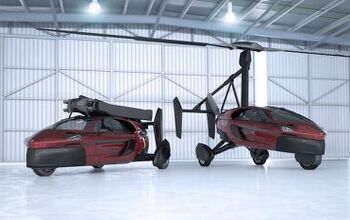Now Might Be a Good Time to Sell Your Car

After coronavirus lockdowns wiped out vehicle production for a few months, dealer inventories are going to have to wait a little longer than normal to be resupplied with new product. Meanwhile, the used market has become awash with cars offloaded by rental agencies with no use for them — except as a way to drum up cash during a difficult time.
Chuck in every American citizen getting free money from the government and you’ve got yourself the perfect storm. Average folks are thinking about using that money on a new car and dealers need to offset depleted inventories and delayed deliveries by scooping up used ones for the purpose of flipping. That’s driven up prices, which could potentially work in your favor if you happen to have an automobile you no longer have much use for.
If you track used vehicle pricing on the regular, you may have already noticed that secondhand truck prices have gone up. Suppressed for ages by a strong new-vehicle market, North America’s favorite body style didn’t change as factories stopped building new examples. Dealers are struggling to pad out their inventories, making trucks a particularly hot commodity.
But increased demand hasn’t been exclusive to trucks. Dealers are willing to buy up practically anything they think they can turn a profit on. Citing figures from J.D. Power, Automotive News reported that wholesale prices rose 16 percent over the 7 weeks ending on June 7th — or roughly 4 percent above the pre-virus forecast:
According to Cox Automotive, wholesale prices rose 2.1 percent for the week of June 1, while retail prices climbed 0.5 percent, squeezing margins for dealers. As of June 6, wholesale prices were down just 0.6 percent from the beginning of the year, while retail prices were off 1.1 percent.
“So the big disconnect between retail and wholesale prices is gone,” Cox Automotive Chief Economist Jonathan Smoke said in a market update last week.
The used-vehicle market is reflecting, in part, the tight supply of new vehicles, especially pickups, after manufacturers lost about two months of production in North America. That shortage has sent more new-truck shoppers picking from the used-vehicle lot, tilting the balance of supply and demand.
The situation is fluid, however. Factories the world over have been running for a few weeks now and, despite supply chain bottlenecks guaranteed to slow things down for quite some time, new product is coming. Meanwhile, more secondhand vehicles will continue to arrive in large numbers as the year progresses. Forced into bankruptcy by the pandemic, Hertz is dumping its inventory onto the market at discounted rates. This will continue, joined by other rental agencies looking to cut costs during a bad phase or simply swap old stock for new. Auction houses are also gearing up for a restart after furloughing thousands of workers.
That’s likely to take already elevated used vehicle pricing and spike it squarely into the pavement. Our mystery influencer is the presumed economic recession. If global finances remain in a relatively healthy place, we’re likely to see pricing go back to what we saw long before COVID-19 migrated out of China. However, if high unemployment levels are anything to gauge the future by, there’s a strong chance dealers will cut wild deals on just about everything just to make a sale.
Don’t expect it to be like our last recession, however. Unlike what happened in 2007, fuel prices are impressively low and unlikely to make any individual segment a liability. Loan approvals are also pretty easy to get (for now) and the industry is offering deals that would appeal to cash-strapped buyers. Assuming the situation doesn’t move south in a hurry (e.g. another round of months-long lockdowns), the industry can probably avoid sacrificing lines of credit to make up the difference.
We know — that’s speculative to a point where the info provided is borderline useless past the coming month, yet that’s kind of where we’re at right now. Above-averaged used pricing isn’t likely to last much longer, but secondhand autos may still look very appetizing if employment levels don’t bounce back swiftly and new vehicles become harder to wrangle if your credit score leaves something to be desired.
Black Book expects used vehicle sums to fall 15 percent below pre-COVID-19 projections this summer before recovering next year. J.D. Power, on the other hand, predicts a more normal depreciation, with wholesale valuations dropping between 2-4 percent by year’s end against the mostly flat projections that existed before the pandemic.
[Image: David Touchtone/Shutterstock]

A staunch consumer advocate tracking industry trends and regulation. Before joining TTAC, Matt spent a decade working for marketing and research firms based in NYC. Clients included several of the world’s largest automakers, global tire brands, and aftermarket part suppliers. Dissatisfied with the corporate world and resentful of having to wear suits everyday, he pivoted to writing about cars. Since then, that man has become an ardent supporter of the right-to-repair movement, been interviewed on the auto industry by national radio broadcasts, driven more rental cars than anyone ever should, participated in amateur rallying events, and received the requisite minimum training as sanctioned by the SCCA. Handy with a wrench, Matt grew up surrounded by Detroit auto workers and managed to get a pizza delivery job before he was legally eligible. He later found himself driving box trucks through Manhattan, guaranteeing future sympathy for actual truckers. He continues to conduct research pertaining to the automotive sector as an independent contractor and has since moved back to his native Michigan, closer to where the cars are born. A contrarian, Matt claims to prefer understeer — stating that front and all-wheel drive vehicles cater best to his driving style.
More by Matt Posky
Latest Car Reviews
Read moreLatest Product Reviews
Read moreRecent Comments
- Spectator Wild to me the US sent like $100B overseas for other peoples wars while we clammer over .1% of that money being used to promote EVs in our country.
- Spectator got a pic of that 27 inch screen? That sounds massive!
- MaintenanceCosts "And with ANY car, always budget for maintenance."The question is whether you have to budget a thousand bucks (or euro) a year, or a quarter of your income.
- FreedMike The NASCAR race was a dandy. That finish…
- EBFlex It’s ironic that the typical low IQ big government simps are all over this yet we’re completely silent when oil companies took massive losses during Covid. Funny how that’s fine but profits aren’t. These people have no idea how business works.


































Comments
Join the conversation
Around here (Southern Ontario), it looks like the focus is more on shifting new inventory. Everybody is offering some variation of six months no payment and/or 0% financing, but used prices haven't shifted much which tends to lead buyers to new vehicles. Except for the ones I'm shopping for of course.
I read an article posted April 22 by Autotrader where it said 'the bottom fell out on wholesale used vehicle prices — they’re down approximately 12% from a year earlier. It was described as a historic drop.' So when you say 'wholesale prices rose 2.1 percent for the week of June 1' does that mean they rose 2% from the 12% drop? So much conflicting info out there.. the article posted by Autotrader a couple weeks before this one said Dealers have no interest in buying your car and the advice was to 'Hold On to Your Used Vehicle'.. All I know is that I've had my car listed for over 90 days with no hits. I don't know where you're getting your info from..